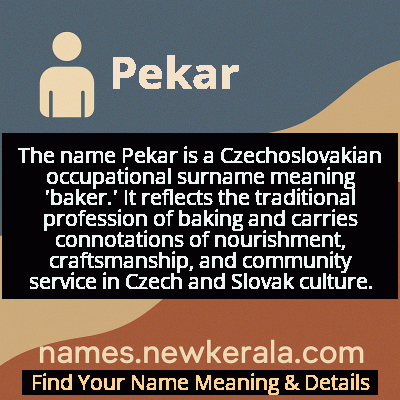Pekar Name Meaning & Details
Origin, Popularity, Numerology Analysis & Name Meaning of Pekar
Discover the origin, meaning, and cultural significance of the name PEKAR. Delve into its historical roots and explore the lasting impact it has had on communities and traditions.
Name
Pekar
Gender
Male
Origin
Czechoslovakian
Lucky Number
6
Meaning of the Name - Pekar
The name Pekar is a Czechoslovakian occupational surname meaning 'baker.' It reflects the traditional profession of baking and carries connotations of nourishment, craftsmanship, and community service in Czech and Slovak culture.
Pekar - Complete Numerology Analysis
Your Numerology Number
Based on Pythagorean Numerology System
Ruling Planet
Venus
Positive Nature
Harmonious, responsible, caring, and artistic.
Negative Traits
Overly idealistic, superficial, possessive, or jealous.
Lucky Colours
Pink, turquoise.
Lucky Days
Friday.
Lucky Stones
Diamond, turquoise.
Harmony Numbers
2, 3, 9.
Best Suited Professions
Artists, musicians, teachers, healthcare workers.
What People Like About You
Warmth, nurturing nature, artistic flair.
Famous People Named Pekar
Jan Pekar
Historian and Writer
Renowned Czech historian specializing in Central European history and author of several influential historical works
Milan Pekar
Businessman
Successful Czech entrepreneur who built one of the largest bakery chains in Central Europe
Petr Pekar
Musician
Award-winning Czech classical guitarist and composer known for modern interpretations of traditional Czech music
Josef Pekar
Academic
Influential Czech historian and university professor who shaped modern Czech historical scholarship
Name Variations & International Equivalents
Click on blue names to explore their detailed meanings. Gray names with will be available soon.
Cultural & Historical Significance
The name also reflects the historical development of surnames in the region, where occupational names became standardized during the Habsburg monarchy's administrative reforms. Many families carrying the Pekar name can trace their lineage to ancestors who operated bakeries or worked in grain-related trades. During the Czech National Revival in the 19th century, such distinctly Czech occupational names gained additional significance as markers of cultural identity and resistance to Germanization pressures. Today, the name continues to represent Czech and Slovak heritage, embodying values of hard work, craftsmanship, and community service that have characterized these cultures for generations.
Extended Personality Analysis
Individuals bearing the name Pekar are often perceived as embodying the traditional values associated with their occupational origins - reliability, practicality, and a strong work ethic. They tend to be methodical and detail-oriented, approaching tasks with the same precision that a master baker would apply to measuring ingredients and timing proofs. This practical mindset is typically complemented by a nurturing nature, as the historical baker's role involved feeding and sustaining their community. Pekars are often seen as pillars of stability in their social circles, providing consistent support and dependability to those around them.
Beyond these foundational traits, many Pekars demonstrate creative problem-solving abilities and entrepreneurial spirit, reflecting the business acumen required to run successful bakeries through changing economic conditions. They often possess a blend of traditional values and innovative thinking, honoring time-tested methods while adapting to modern circumstances. The name suggests someone who is community-minded, with a strong sense of responsibility toward others and a practical approach to helping solve problems. Their personality often combines the warmth and generosity associated with sharing bread with the disciplined craftsmanship required to perfect their chosen endeavors.
Modern Usage & Popularity
In contemporary times, Pekar remains primarily a surname rather than a given name, though it continues to be proudly carried by families throughout the Czech Republic, Slovakia, and their global diaspora. The name maintains strong connections to Czech and Slovak cultural identity, particularly among immigrant communities seeking to preserve their heritage. While not commonly used as a first name, it appears frequently in business contexts, especially in the food industry where entrepreneurs leverage its authentic baker connotations. Recent years have seen a modest resurgence of interest in traditional occupational names as younger generations rediscover their ancestral trades and cultural roots. The name's usage patterns reflect broader trends in Central European naming conventions, where occupational surnames remain stable across generations while serving as living connections to family history and traditional crafts.
Symbolic & Spiritual Meanings
Symbolically, the name Pekar represents nourishment, transformation, and community foundation. Like the baker who transforms simple ingredients into life-sustaining bread, the name carries connotations of creation and sustenance. It symbolizes the alchemical process of turning raw materials into valuable products through skill and patience. The oven warmth associated with baking extends metaphorically to suggest emotional warmth, hospitality, and caring for others' basic needs. In a broader sense, Pekar embodies the concept of daily renewal and reliability - just as communities depend on their baker for daily bread, the name suggests dependability and consistent contribution to collective wellbeing. The rising of bread dough serves as a powerful symbol of growth, potential, and the patient development that leads to meaningful results, making the name emblematic of gradual but substantial achievement through dedicated effort.

